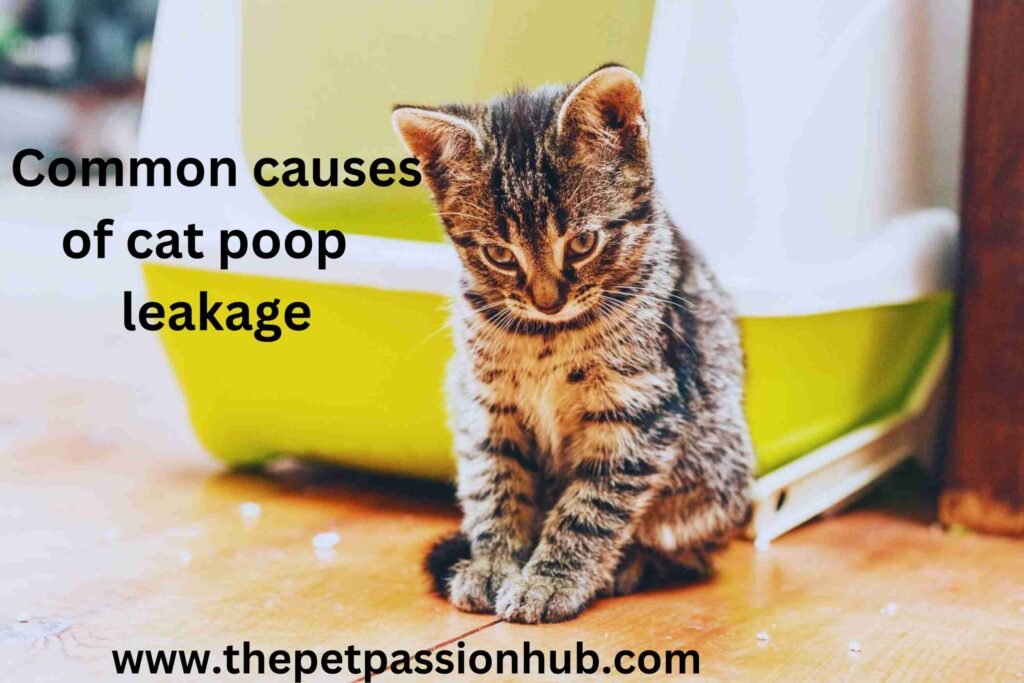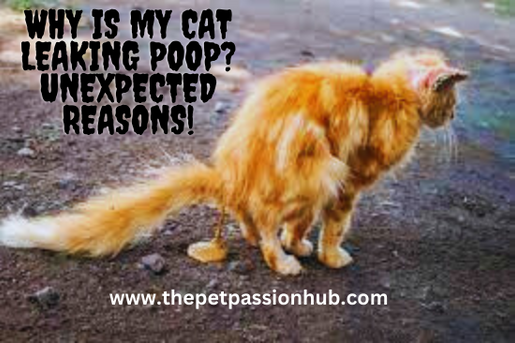Introduction
Have you ever been greeted by the unpleasant sight of your cat leaving a trail of poop as they walk? It’s a distressing and unexpected problem that many cat owners face, but fear not. There are often surprising reasons behind this mysterious behavior.
In this article, we’ll delve into the world of feline health to explore why cats may be leaking poop. Uncovering some unexpected culprits along the way. From dietary issues to underlying medical conditions, understanding the root cause of this unsettling behavior. That is crucial for ensuring the well-being of our beloved furry friends.
So, if you’ve ever found yourself wondering why is my cat leaking poop? then prepare to have your curiosity satisfied as we reveal the unexpected reasons behind this perplexing feline phenomenon.
Understanding your cat’s health
Understanding your cat’s health is critical for any responsible pet owner. Feline incontinence, or the involuntary leakage of urine or feces, can be a distressing for both you and your cat.
It’s essential to recognize that this issue may have underlying causes that require attention and care from a veterinary professional. While it can be uncomfortable to discuss, addressing these concerns with compassion. Understanding is crucial for maintaining your cat’s health and well-being.
One key aspect to consider is that feline incontinence may not solely result from physical ailments. But could also stem from psychological stressors such as anxiety or behavioral issues. A thorough examination by a veterinarian can help pinpoint the root cause of the problem. And provide appropriate guidance on how to manage it effectively.
By gaining an in-depth understanding of your cat’s overall health. You’ll be better equipped to address any unexpected challenges like leaking poop with empathy. And practical solutions rooted in expert advice.
Common causes of cat poop leakage
Signs your cat may have a bowel problem can include frequent diarrhea, straining in the litter box, and accidents outside the litter box. These symptoms could indicate a range of issues, including food allergies, parasites, or inflammatory bowel disease.
However, one often overlooked cause of cat poop leakage is obesity. Excess weight puts pressure on the rectum and can lead to difficulties holding in stool, resulting in leakage.

Another surprising cause of loose stool in cats is stress. Cats are sensitive creatures, and changes in their environment or routine can trigger gastrointestinal upset.
From moving to a new home to introducing a new pet or even changes within the family dynamic. Stress can manifest as diarrhea and ultimately result in poop leakage for your feline companion.
Understanding these unexpected causes of cat poop leakage can help you better address your cat’s health needs and provide appropriate care to keep them happy and healthy.
Why Do Cat’s Tail Puff Up! Discover 6 Fascinating Reasons
Diet and gastrointestinal issues
Diet plays a crucial role in managing gastrointestinal issues in cats, and poor diet choices can lead to unexpected bouts of abnormal fecal leakage. High-fiber diets, for example, can help regulate bowel movements and prevent constipation, a common culprit of fecal leakage in cats.
On the other hand, low-quality commercial diets with excessive fillers and additives may contribute to digestive disturbances, leading to unpredictable bowel movements and leakage.
Probiotics are emerging as a powerful tool in addressing gastrointestinal issues in cats. These beneficial bacteria can support healthy digestion by promoting the growth of good gut flora and balancing the intestinal environment.
Incorporating probiotics into your cat’s diet may alleviate symptoms of fecal leakage by enhancing overall gut health and improving nutrient absorption.
Why Is My Cat Leaking Poop? 5 Vet-Reviewed Reasons & Treatment
Stress and anxiety in cats
Stress and anxiety in cats can lead to a multitude of health issues, including digestive disturbances. Feline stress can be triggered by various factors such as changes in the household, new pets, or loud noises.
When cats are stressed, their bodies release hormones like cortisol which can affect their digestive system. This can result in symptoms such as diarrhea, constipation, or even fecal incontinence.
It’s crucial for cat owners to recognize the signs of feline stress and anxiety. These may include excessive grooming, hiding more than usual, loss of appetite, or agitated behavior.

Addressing the root cause of stress is essential for managing these digestive issues in cats. Providing a calm environment with plenty of hiding spots and using pheromone diffusers can help alleviate anxiety levels and improve your cat’s overall well-being.
Understanding the connection between stress and bowel issues is vital for cat owners seeking to support their feline companions’ health effectively.
By recognizing the symptoms of feline digestive disorders stemming from stress and implementing appropriate interventions, cat owners can ensure that their beloved pets enjoy a better quality of life while addressing concerns related to unexpected bowel problems.
Medical conditions affecting bowel control
Medical conditions affecting bowel control in cats can be a source of concern for pet owners. One common issue is feline inflammatory bowel disease (IBD), which can cause diarrhea, vomiting, and weight loss.
This condition occurs when the immune system attacks the lining of the digestive tract, leading to chronic inflammation and poor nutrient absorption. Another potential culprit is feline constipation, often caused by dehydration, dietary issues, or hairballs. If left untreated, constipation can lead to fecal impaction and even rectal prolapse.
Moreover, cats may also suffer from neurologic problems that affect their ability to control their bowels. For example, injuries or diseases affecting the nerves in the lower back and pelvic area can result in fecal incontinence or difficulty passing stools.
It’s important for cat owners to be attuned to changes in their pet’s litter box habits and seek veterinary care at the first sign of trouble.
By addressing these medical conditions promptly with proper treatment and management strategies, cat owners can help ensure their furry friends maintain healthy bowel control and overall well-being.
Behavioral issues and litter box problems
Behavioral issues and litter box problems can often be a source of frustration for cat owners. While feline digestive problems are often the first concern when a cat is leaking poop, behavioral issues should not be overlooked.
Stress, anxiety, or changes in the environment can lead to litter box aversion, causing cats to seek out alternate places to relieve themselves.
Understanding feline bowel movements involves considering the psychological and environmental factors that may be contributing to the issue.
Addressing litter box problems requires a multifaceted approach that takes into account both physical and psychological health. It’s essential for cat owners to provide a clean and welcoming litter box environment while also addressing any underlying behavioral issues that may be causing their cat’s inappropriate elimination behavior.
By recognizing the complex interplay between feline behavior and physical health, owners can take proactive steps to help their cats overcome litter box challenges and maintain their overall well-being.
Conclusion: Seeking veterinary care for solutions
In conclusion, seeking veterinary care is crucial for finding solutions to feline health issues, especially when it comes to abnormal poop.
While it can be uncomfortable and distressing to witness a cat leaking poop, it’s essential to remember that there are often underlying reasons for this behavior.
Consulting with a veterinarian allows for a comprehensive examination and diagnostic testing to uncover any potential medical issues contributing to the problem.
It’s important not to delay seeking professional help as prolonged issues with abnormal fecal leakage can lead to further complications and discomfort for the cat.
By working closely with a veterinarian, pet owners can explore various treatment options tailored to their cat’s specific needs, allowing for effective management or resolution of the issue.
Ultimately, prioritizing veterinary care is key in ensuring the best possible outcome for both the feline companion and their concerned owner.
FAQs
Q: Why is my cat leaking poop?
A: There are several possible reasons, including medical conditions, dietary issues, and behavioral factors.
Q: Is it normal for a cat to leak poop?
A: No, it is not normal for a cat to leak poop. It can be a sign of an underlying health problem.
Q: What are some common medical conditions that can cause a cat to leak poop?
A: Conditions such as diarrhea, constipation, anal gland problems, and neurological issues can lead to fecal incontinence in cats.
Q: Can diet contribute to a cat leaking poop?
A: Yes, certain foods or dietary changes can affect a cat’s bowel movements and lead to leakage.
Q: How can I help my cat if it is leaking poop?
A: You should seek veterinary care to determine the underlying cause and develop a treatment plan.
Q: Can stress or anxiety cause a cat to leak poop?
A: Yes, stress or anxiety can impact a cat’s digestive system and potentially lead to fecal incontinence.
Q: Are there any preventive measures I can take to avoid my cat from leaking poop?
A: Maintaining a balanced diet, providing regular exercise, and minimizing stressors can help prevent fecal incontinence in cats.
Q: When should I seek veterinary attention for my cat’s fecal incontinence?
A: If you notice your cat consistently leaking poop or experiencing other concerning symptoms, it’s important to consult with a veterinarian promptly.
